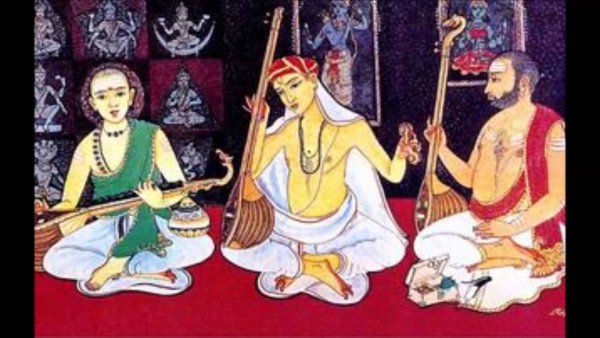Indian Music Maestro Tyagaraja
Indian Music Maestro Tyagaraja:
Ancestors of Tyagaraja:
Vijayanagara Empire was famous for its great culture and glory. The invasion from the North brought all its glory to Vijayanagara Empire fell at the end of the 16th century. The empire gave a lot of value to poets and musicians. Some belonged to the Brahmin family. With the decline of the Vijayanagara emperor, the ancestors of the Indian music maestro tyagaraja family they have had to flee to Southern areas, which were still peaceful. Some got shelter under the good-natured rule of the Nayakas and the Maratha kings of Tamilnadu.
Notably, several Telugu families went South and performed their skills in art and culture, and Tyagaraja’s ancestors belonged to one such family. Once, Tyagaraja describes himself as descending from the Kakarla family. Kakarla is present in the Kurnool District of Andhra. Tiruvarur in the Tanjavur district of South India is small in size.

Early days of Indian Music Maestro Tyagaraja:
Tyagaraja was born on 4th May 1767 in Tiruvarur. His father’s name was Rama Brahmam, and his mother was Seetamma. His grandfather Girija Kavi, a poet-composer, worked in the court of Thanjavur. When Tyagaraj was a boy, Ramabrahmam shifted to Tiruvayyaru, leaving Tiruvarur. The king of Tanjavur had gifted a house to him in this village, and here Tyagaraja spent most of his life and attained Samadhi in the same town. Tiruvayyaru, on the bank of the Kaveri and the abode of saints, poets, and musicians. Tiruvayyaru seems to have a lot of traditions in follow town. Most of the people in this village are interested in Indian music practice and the composition of ragas.
Marriage and Family:
Tyagaraja married a girl called Parvati at eighteen, who died without leaving any children. He then married her sister, Kanakamba. A daughter, Seetalakshmi, was born to them, and she was given in marriage to Kuppuswami. They spawned a boy who was named Tyagaraja. Some called him Panchapakesa. He died issueless.
Composing the Ragas:
Tyagaraja was a profound scholar and poet. He studied Sanskrit and astrology and was well-versed in his mother tongue, Telugu. He became the disciple of Sonthi Venkataramanayya, and under his guidance, Tyagaraja became the foremost singer of the day. His genius is evident in every raga of his creation. His genius composition of Pancha Ratna kritis (the five gems ragas) reveals his mastery of musical technique. Apart from thousands of ragas of kriti type, he composed utsava sampradaya katanas and Divya nama sankeertanas, which ragas are sung in devotional congregations. He has also created two operas: Prahlada Bhakti Vijayam and Nauka charitram. Besides them, he composed several songs in Sanskrit; some are in Telugu, also.
Most of his songs indicated the beauty of his art. There is no unwanted phrase or problematic juxtaposition of the word. There is only music and feeling. He did not follow the traditional concept of music; he created it in his way with no bounds. With new melodies, he made the ragas like Kharaharapriya, Harikambhoji and Devagandhari, the masterpieces in his composes. With so much effort, he brought glory to Indian music.
His command over Telugu and Sanskrit led him to create ragas with rare felicity and homeliness to the listeners. Spiritually he was one of the rare souls who gave up everything except bhakti and cared for nothing else beyond the Grace of God. The early influences on his life made this trend more pronounced.

Tyagaraja and Lord Rama:
Tyagaraja was a great devotee of Lord Rama. While singing the song on Rama, he treated Rama as a friend, a master, a father, anything he could conceive of. Hearing of Rama’s name was to Tyagaraja like “obtaining a large kingdom”.
Miracle in Tirumala Temple:
Tyagabrahma travelled to the sacred places of South India. Wherever he went, he sang of the deity of the site. The famous incident happened when he visited the Venkateswara temple at Tirupati. He goes into the temple to have a darshan (vision) of the Lord, but the entrance of the sanctum is covered with a curtain that prevents him from seeing the idol. The priests refuse to part the curtain. In great sorrow, he sings a raga, “Will you not remove the curtain?” The curtain miraculously slides aside by itself, and he is face to face with Lord Venkateswara.
Left the Physical Body:
Tyagabrahmam took sannyasa at the end of his life and attained Samadhi on 6th January 1847. There is a story about his death once he says in one of the most moving songs, “Unerringly I saw Sri Rama installed on the hill…Thrilled with ecstasy, with tears of joy, I tried to speak. He promised to bless me in five days.” And so it happened.
His service to Indian music caused present musicians and composers still follow his traditional songs.